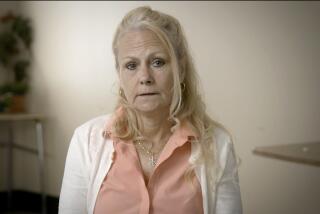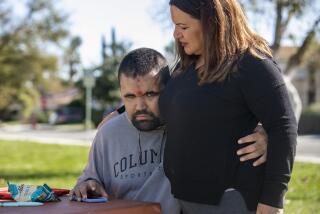Accidental foster mother stands by her son
- Share via
CHICAGO — Patricia Simples journeys to a prison in southern Illinois to visit a young man she considers her son.
A guard escorts her to a visiting room, where she wraps her arms around Terrence Strong and tries to hold back her tears.
Their powerful bond was born one summer evening 10 years ago, when Simples, a single pathologist, waited for the valet outside a Chicago restaurant. She overheard an 11-year-old boy in a dirty shirt and broken sneakers say he didn’t get any gifts for his birthday. On impulse, Simples went and bought him presents.
Since that moment Simples, now 49, has done something many consider idly but few actually carry out: Step by step, she took an underprivileged child under her wing.
She has stood by Strong through thick and thin, even when he stole from her, even after he was convicted on drug charges.
He, in turn, trusted her -- so much that when he fled the law and tried to disappear to the world, she was the one he called, week after week.
And she faced one of the most daunting tasks a mother could ever face: talking her son into surrendering to the police.
Some say Simples is a saint; others worry that she is being used. She has asked herself the same question.
“Probably to the average person, they can’t understand it, and I’m not sure that I understand it,” Simples said.
Slowly she is coming to terms with the reality that sometimes you can’t force a happy ending. Still, she has found meaning in the journey.
The relationship began in July 1998, when Simples, just finished with a business dinner, encountered Strong. She overheard him saying to a valet parking attendant that he had gotten nothing for his 11th birthday; she handed him a $5 bill and told him to buy himself some ice cream.
That did not seem like enough to her, though. Simples returned a few days later with birthday presents she had bought at a toy store, enlisting an employee to help pick them out. She gave them to Strong, who recalls being shocked. Strong then lived in a public housing complex, where he grew up with 10 siblings. With little supervision, he said, he stayed out late, smoked and skipped school.
Just a month later, Simples came looking for Strong at the restaurant and learned he had was in juvenile detention.
She tracked down his probation officer and asked what she could do to help. The officer made her Strong’s mentor. In that role, she picked him up on Saturdays and took him to parks, the circus and tutoring.
During one tutoring session, Simples slipped out to buy lunch for the two of them. Strong feared she would not return. Later, as they planned future outings, Strong awkwardly asked her, “How long are you going to be around?”
“As long as you want me to be around,” she recalls answering.
That promise was tested just a few months later.
A juvenile court judge gave custody of Terrence Strong to the Illinois Department of Children and Family Services on March 7, 2000, because the judge determined that his mother was unable to properly care for him.
Having often seen Simples at Strong’s hearings, the judge had also asked Simples whether she could become the boy’s temporary legal guardian.
Simples knew the change would upset her comfortable, predictable life. Still, she brought the boy home and officially became his foster mother that month. She was 41 years old.
Strong’s biological mother, Esther Strong, now 50, a nurse assistant, said she was initially hesitant about Simples, but eventually appreciated her.
“I was his mother. I just felt kind of depressed, kind of disappointed. But after that, it was nice. She is a very nice person,” Esther Strong said. “I have 11 kids -- any help that I can get would help.” The two women never became close, but his foster mother said she always found his family welcoming.
Simples bought clothes for Strong, took him on trips and paid him for doing chores. He went to school and therapy.
But Simples discovered that helping Strong was more complicated than just giving him things. Counseling did not seem to help. And Simples’ love could not replace family bonds.
“You think that you take a kid like this, give him clothes, money, food,” Simples said. “I naively thought everything would be OK.”
Strong appreciated all that. But he was bored too, he recalled, and longed for the freedoms he had living with his birth family.
Three months after Simples became his foster mother, Strong began disappearing for short periods. At one point, he stole $2,000 from Simples.
Simples reported his behavior problems to his caseworker, who took him out of Simples’ home. Strong begged Simples to keep him, but she stood her ground, knowing that she could not handle him.
Strong lived in child welfare facilities for about two years. In 2002, because he was behaving better and attending counseling, Simples took him back.
Months later, Simples found 100 little marijuana bags among his things. She told Strong’s probation officer and wrote a letter to have him removed again.
But she never cut him off. Even as Strong moved from correctional facilities to group homes in the years that followed, Simples visited and advocated on his behalf.
In 2005, Strong ran away from a southern Illinois residential home again, returning to his birth family in Chicago.
A year later, then 19, he was charged as an adult with possession of a controlled substance. He pleaded guilty.
While on probation, he pleaded guilty to a new charge of delivering a controlled substance. Again he served probation, and again, in August 2007, he violated that probation.
A court hearing was scheduled for September. Simples begged a reluctant Strong to attend, even going so far as to drive him to the courthouse. But, while they waited for the judge to call his name, Strong left.
Simples called him over and over on his cellphone, urging him to return to court, knowing that if he didn’t that the judge would issue a warrant for his arrest. Strong did not listen.
For three months, Strong was gone. All Simples knew was that once a week or so, he would talk to her by phone. If police asked her where he was, she could tell the truth: She didn’t know.
But she tried everything she knew to get him to turn himself in.
She told him that if he didn’t, he could never be free of the past. She paid for his cellphone for one month and enlisted the help of a minister, whom she asked to call Strong. She offered to drive him to the police station with a friend of hers who was an officer. She warned him she would stop supporting him financially if he remained on the lam.
Strong said he understood, but never accepted any of her offers.
Instead, a few days before Christmas, he walked to a police station, gave himself up and called Simples.
At a hearing in January, Simples hired an attorney for Strong, writing a $500 check on the spot.
The attorney told Simples that Strong’s behavior “tells me and tells the judge that he is out there selling dope while on probation.” Simples defended Strong. But the attorney was skeptical.
“You believe what he tells you?” he asked Simples.
On Jan. 11, Strong was sentenced to his first stint in an adult prison: three years. Taking into account time served and good behavior, he expects to get parole this summer.
Simples’ relatives try to understand her decision to help this young man.
Meeting Strong opened Simples’ heart, said her sister, Roni Glover, a consultant who lives in Texas.
“At that moment he became her son,” Glover said. “And she is not going to give up on him.”
Simples’ mother, Faye Clark, a retired educator in Texas, has worried at times that Strong has taken advantage of her daughter.
“I thought that, but I dare not say that to her,” Clark said. “Maybe this is her calling in life. When it’s time to stop, she will know.”
That time has not come just yet -- Simples continues to visit Strong and has promised that he can move in with her when he gets out of prison and looks for a job.
During a prison interview, Strong said he planned to try avenues other than selling drugs to make money. But he has doubts.
“If I can’t find that, will I go back to what I [was] doing? I probably would,” he said.
He left little question, however, about his feeling for Simples. He said he regretted having hurt her. He called her his angel, his ace.
He too is surprised that she has stuck around.
“I have been going through a lot and you have been there for all of it,” he told Simples in a letter from jail. “I never realized that it was just love.”
Simples is optimistic about the future but knows well the obstacles. She vows to support Strong if he chooses to work but says she will have to step aside if he rejects her help and decides to sell drugs.
The choice will be his.
“It’s hard because there’s no script for this,” she said. “The story is not over yet.”
More to Read
Sign up for Essential California
The most important California stories and recommendations in your inbox every morning.
You may occasionally receive promotional content from the Los Angeles Times.












